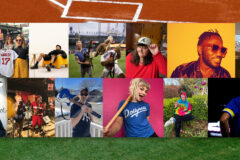Caleb Followill needs a dentist. The day before the biggest gig of his life, the 26- year-old Kings of Leon frontman is standing outside a boutique hotel in London, flanked by his bald, tattooed bodyguard and his girlfriend, a thin, dark-haired model named Lily Aldridge. Down the block, a handful of onlookers nod toward Followill, who has a gray trilby tilted low over his heavily stubbled face and a maroon Jordache T-shirt and skinny black jeans tightly covering his ropy frame.
“I’ve been grinding my teeth,” he says, climbing into a waiting car. “I’ve got to go get a mouth guard.”
A few hours later, he’s on a bus with his bandmates, their significant others, and his mother and stepfather, feet propped on the seat across from him, with the rolling green hills and crumbling stone walls of the English countryside whipping past him out the window.
“The dentist said it was stress,” he says. “At night in my dreams, I’ll be telling myself, ‘Don’t grind your teeth.’ But I wake up and can taste the powder. I’m grinding them so hard they turn to powder.”
Currently weighing on him is tomorrow’s show: Caleb, his older brother Nathan, younger brother Jared, and cousin Matthew will top the Glastonbury Festival’s opening-night bill.
Glastonbury is more than the largest festival in the U.K. — it’s a cultural institution. Begun in 1970, the festival hosts more than 170,000 revelers and has played the part of both launching pad and kingmaker for bands such as Oasis, Radiohead, and Coldplay. The Kings’ headlining slot has proved somewhat controversial, with many, including Barry Fratelli, bassist for Scottish alt rockers the Fratellis, complaining publicly that they didn’t deserve the honor.
Caleb, who on the Kings’ records often evinces a cocky, chest-thumping swagger, looks considerably more subdued sitting across the aisle from his mom as the bus rolls along under a graying sky. “I’m definitely nervous,” he says.
“Don’t you worry, baby — Mama’s here,” his mother, Betty Ann Murphy, coos in her warm, chirpy Southern drawl. “Just remember: There may be bands that are louder or bigger than you, but no one’s as good-looking as you boys or plays as well as you boys do.”
Caleb sinks into his seat and offers an embarrassed half-smile. “Uh, thanks, Mom.”
To most U.S. passport holders, the idea that Kings of Leon would even be considered to headline a major festival is probably a shock. In America, they’ve sold roughly 200,000 copies of each of their first three albums and generally play midsize clubs and theaters. In the rest of the world, however, they’ve sold nearly three million albums — half of that in the U.K. alone — and regularly headline arenas. A December 11 date at the 20,000-capacity O2 Arena in London sold out in less than an hour. Here, they’re bona fide celebrities. As Nathan puts it, “It’s almost like we live the life of two bands.”
The Kings’ fourth album, Only by the Night, may offer them a chance to reconcile their two identities. Filled with sing-along melodies, dramatic crescendos, and lighter-waving choruses, it’s an ambitious, arena-size classic-rock record. But America has largely resisted the Kings’ musical charms and William Faulkner-worthy backstory before. Is there any reason to believe this time will be different?





